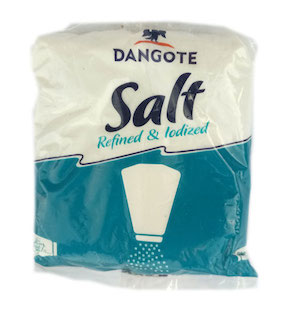Looking for Nigerian foods rich in iodine?
Then you're in the right place...
Because in this post I reveal the complete list of Nigerian foods high in dietary iodine.
Let's get to these foods right away...
Nigerian Iodine-rich Foods List
Here are 10 Foods you can find in Nigeria that are rich in iodine and their iodine count:
1. Egg
Egg (specifically the yolk) is a beautiful source of iodine. A large egg on average provides 26mcg of iodine (1), which is about 16% of the daily recommended iodine intake.
You should note that the iodine content of eggs varies based on the feed the chicken was fed (2).
In summary, eggs are a great source of iodine, with the yolk being the main supplier.
2. Stockfish (Cod)
Stockfish ( also called Panla or Okporoko) are low in fat and an excellent source of essential nutrients including iodine.
85 grams of Stockfish contains 63–99 mcg approximately, which translates to 42–66% of the daily recommended iodine amount (3, 4).
Studies have found that the iodine content of stockfish varies depending on the water the fish lives and the region the fish was caught as well (5, 6).
In essence, stockfish is low-fat and offers a wide variety of nutrients including iodine.
3. Tuna
Tuna is a fatty fish which is low in calories, high in protein and relatively high in iodine.
3 ounces of tuna delivers about 17 mcg of iodine, which is around 11% of the recommended daily intake of iodine (9).
You see, fatty fishe are usually low in iodine but tuna manages to have a significant amount of iodine. In addition, tuna fish is also rich in potassium, iron, vitamin B and omega-3 fatty acids (10).
4. Shrimp
Shrimp is a delicious, low-calorie seafood that is a rich source of iodine (11).
3 ounces of shrimp supply around 35 mcg of iodine, which is 23% of recommended daily iodine intake.
Shrimp and other seafood are rich in iodine because they soak up iodine naturally present in seawater (12)
In addition, you will get crucial nutrients such as vitamin B12, selenium and phosphorus from shrimp (13).
5. Crab
Crab is another lovely seafood that contains iodine. Although crab contains less iodine than other seafood, it still supplies 26 to 50mcg of iodine per 100g serving (14)
Also, crab is a great source of protein, selenium, B12, and zinc.
6. Milk
Milk is one of the dairy products that are a great source of iodine. The iodine content of milk varies based on factors like season, yield, feed and treatment method of the cow (15).
On average, you can expect a cup of non-fat milk to supply about 85mcg of iodine, which is about half (50%) of the recommended daily iodine intake (16).
7. Yogurt
Yogurt is another dairy product that is an excellent iodine source.
For example, a cup of Greek yogurt supplies as much as 116mcg of iodine, which is about half (50%) of the recommended daily iodine intake (17).
8. cheese
Cheese is yet another dairy product that is a decent iodine source.
While some cheese contains more iodine than others, you can expect 100g of cheese to supply around 37.5 mcg on average (18).
Cottage cheese supplies one of the highest amounts of iodine compared to other cheese. For instance, a cup of cottage cheese contains about 65 mcg, compared to a cup of cheddar cheese with only 12mcg (19).
9. Prunes
Prunes are plums that have been dehydrated. They are well known to help relieve constipation because they have a fair amount of fiber and sorbitol (a type of sugar alcohol) [20].
Prunes are also one of the few plant sources of iodine.
Just 5 prunes deliver 13mcg of iodine, which translate to 9% of the recommended daily iodine intake (21).
In addition, Prunes are an excellent source of other vitamins and nutrients, including vitamin K, vitamin A, potassium and iron (22).
10. Iodized salt
In an average person's diet, Iodized salt is probably the most popular iodine source.
Just 1/4 teaspoon of iodized salt provides approximately 71mcg of iodine, while just half a teaspoon and some can supply 100% of the daily recommend iodine needs (23, 24, 25).
We do associate iodine with salt, but they're not the same. Most salt vendors will have both types of salt available, so you can mix and match to find what works best for your diet. Pink Himalayan or sea salt are both options with less iodine content.

What is iodine?
Iodine is an essential trace mineral that the body can't make itself, so it has to be ingested through food or dietary supplements.
Iodine can be found naturally in certain foods and it may also be added to some salt seasonings and dietary supplements.
importance of Iodine
Iodine is an essential mineral for making thyroid hormones thyroxine and triiodothyronine, which play a key role in protein production, enzyme activity, and metabolism regulation.
So, insufficient iodine may lead to frequent fatigue, weight gain, dry skin, hair loss, and even cognitive impairment. All of these are some of the symptoms of the medical conditions, hypothyroidism and hyperthyroidism.
Recommended iodine Amounts per day?
The daily recommended iodine intake varies. For example, pregnant women and lactation moms need a significantly higher amount because the risk of iodine deficiency drastically increases.
Here is the daily recommended intake for iodine according to the National Institutes of Health (NIH) includes (26):
- 150mcg for adult men and women
- 220 mcg for pregnant women and
- 290 mcg for lactating women
Risks associated with iodine deficiency
If you don't consume enough iodine each day, it could lead to long-term thyroid hormone problems. (or hypothyroidism). A goiter can form, thyroid hormones are disrupted and pregnant women may suffer miscarriages.
Other symptoms of hypothyroidism are frequent fatigue, weight gain, dry skin, hair loss, and even cognitive impairment.
People at most risk for iodine deficiencies are pregnant females and lactating mums, who require more during these periods, as well as people who eat a low-sodium diet or don't use iodized salt.
Risks of too much iodine
High iodine intakes are usually well-tolerated and cause few problems in healthy people according to the Institute of Medicine Panel on Micronutrients.
In some people, constantly consuming a high-iodine diet has been associated with thyroid gland inflammation and thyroid cancer over time (24)
In addition, consuming a very large amount of iodine in one sitting can lead to temporary discomforts like nausea, diarrhea, fever, and burning feelings in the mouth and stomach.
Conclusion: Nigerian foods rich in iodine
Iodine is an essential mineral required to regulate thyroid function. Seafood and dairy product slisted above are particularly great sources of iodine.
Also, a small dose of iodized salt will usually provide enough iodine to meet daily needs.
Finally, an iodine deficiency can lead to serious long-term side effects and medical conditions like goiter and hyperthyroidism.
